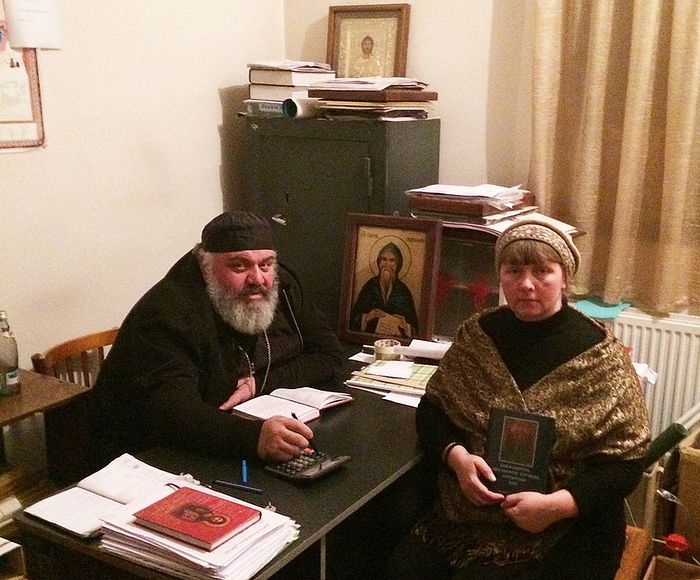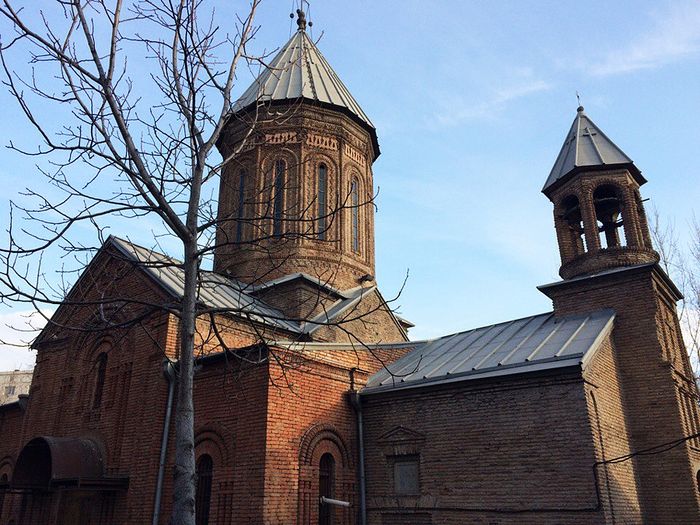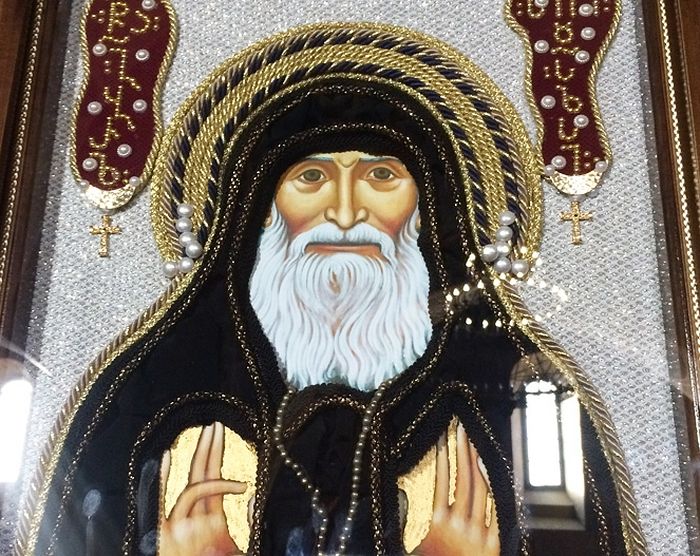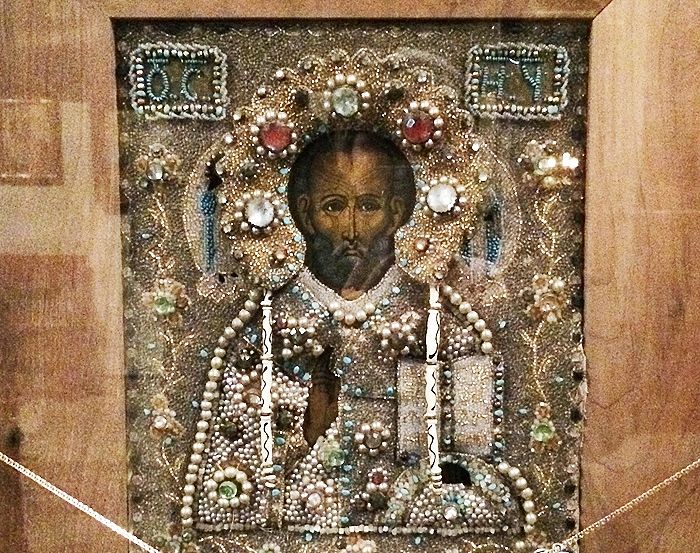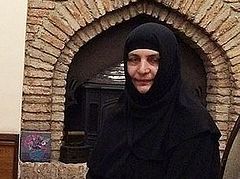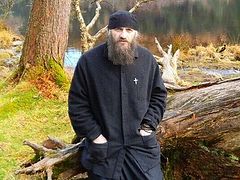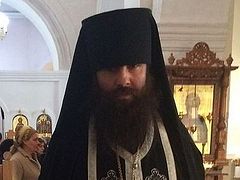At seventeen years of age, the future priest Simon Kiknavelidze was standing on the balcony of his home in Tbilisi. Suddenly he saw how a monk in a cassock faded by the sun stopped directly under his balcony, lifted his head and crossed the young man and his entire house. It was the now-glorified Archimandrite Gabriel (Urgebadze). He was walking through Tbilisi, blessing the city with the Sign of the Cross, and praying for all of Georgia.
After that, there was much that was surprising in Fr. Simon’s life: From a graduate of Tbilisi University and a successful businessman, he became a student of the theological academy. Fr. Simon recalls how in Moscow, on Predtechensky Alley, in the Church of St. Nicholas the Wonderworker, he would speak with St. Nicholas as with the living, and the image of the saint still stands before his eyes decades later. Now Fr. Simon serves in the Church of St. Nicholas in the center of Tbilisi, and he believes it is no accident: It is the mercy of the great saint for him.
The Georgian priest graciously agreed to answer our questions.
—Dear Fr. Simon, could you tell us how you came to faith?
—I was born in Tbilisi in 1964. It was a godless time, and churches and monasteries were closed. I was interested in technology; I studied electronic engineering, and then I enrolled in the physics department of Tbilisi State University. Physics is nature, and in all of nature is God, the Creator.
I was baptized when I was ten, when my grandfather died. Whichever of the children in our home were unbaptized were baptized at that time. Such a pious tradition. When people come to Christ through the departed, it’s good for the departed, and for those who are baptized, it is spiritual birth. The death of one leads to the spiritual birth of others and the increase of the flock.
I well remember 1977—I was thirteen and I was in seventh grade. Us boys would run to Sioni Cathedral, drawn there by curiosity. We understood very little in the services. Under the godless regime, everything was done to scare the people away from faith. For example, they would show the most interesting films on TV on Pascha, which they didn’t show at any other time, to keep the people at home, so they wouldn’t go to the Paschal service.
I remember how His Holiness Patriarch Ilia II would come to Sioni and serve there. He had a driver and guard—one person. They would go to the services together—they were only two, and there were only a few people in the church. That’s how His Holiness began his ministry: in empty churches, with a very small number of clergy, and the same number of parishioners.
There was no such luxury that a priest could be seen with every step. There were very few at that time in Georgia. His Holiness represented the entire Church in his person. I could feel his fatherly concern.
I went to the army, served, returned, and got married in 1991. In 1992, my wife and I were waiting for our first child, and my brother died in January. He was a believer. Two days after his death, his daughter was born. It was a great grief, and it still hasn’t left.
My wife and I went to Moscow, and there was a homily I heard in a church there. The priest said, “When a man communes, he is with Christ.” And I started thinking: If I commune, and the Lord is in me, and I myself am in Christ, and my faithful, departed brother is with the Lord, that means we are together spiritually. This thought shook me so much that everything changed for me from that moment: I became more deeply interested in Christianity, and became closer to the Church.
—And how did your path from parishioner to priest go?
—After that I wanted to learn more about the Creator. I found a spiritual guide—Archpriest Maxim Chanturiya—now the rector of our church. By his prayers, and the prayers of His Holiness, the fathers of Optina Hermitage blessed me to study at the theological academy. I was a businessman at that point and supported a family—such a decision was not easy for me.
When I was getting ready to go to Tbilisi to enter the academy, I prayed to St. Spyridon of Tremithus: “I don’t know how it will happen, but if you can, help!” And a day after this prayer, I wound up in Tbilisi.
I left my business and passed the academy entrance exams, but I had serious doubts: How would I be able to study there, having a family? How will life’s labors be resolved? But my wife supported me and my friends helped. I began my studies.
—It must have been hard for you…
—During my studies, they offered me work as a church warden. I was an altar server too. Then I was ordained as a deacon, and in 2012, as a priest. The Lord took me by the hand and led me.
Then a new heavy sorrow appeared in my family: Our second son died in Tbilisi from some virus. It was the 1990s, the war… They brought generators to the hospitals because the electricity was turned off. I had to look for medicine, but it was hard. I really tried for my son, but, apparently, somehow not enough. It was a terrible grief. On the anniversary of his birth, our third son was born—so the Lord comforted us.
—Which of your spiritual guides had the strongest influence on you?
—I was very affected by the example of Fr. Seraphim (Rose)—how he came to God. Of course, personally—His Holiness. We are all his children.
The person of Fr. Gabriel (Urgebadze), now glorified among the saints, had the strongest influence upon me. Once, in 1981, when I was seventeen, I was standing on the balcony of my home in Tbilisi, leaning on the railing. Suddenly I saw how Fr. Gabriel passed by under my balcony in a cassock faded by the sun. He stopped right under my balcony, lifted his head, and made the Sign of the Cross over me and my entire house. People later told me that Fr. Gabriel would walk throughout Tbilisi and bless our city with the Sign of the Cross.
He was often detained, shut up in a psychiatric hospital, but he feared nothing, openly confessed the faith, and openly prayed for the residents of Tbilisi.
—Fr. Simon, which of the saints do you most often turn to in difficult situations for prayerful help?
—I turn to St. George, the protector of Georgia... The Church of St. George in Moscow is like home for me. I miss it.
St. Nina and the holy Great Martyr Barbara help everywhere and always.
I turn to my patron for prayerful assistance—the apostle Simon the Canaanite (“the Zealot,” as translated from Aramaic). According to tradition, he lived in Cana and was the bridegroom at the wedding where Christ turned water into wine. The apostles Simon the Canaanite and Andrew the First-Called preached in the Iberian land. In about 55 AD, the apostle Andrew went to preach further, along the Black Sea coast of the Caucasus, but the apostle Simon settled into a remote cave, in a gorge of the Psirtskha River. He descended to this cave on a rope, through a small, natural entry. The imprint of St. Simon’s foot is preserved on a rock in the gorge, and it was there that the apostle accepted a martyr’s death for Christ.
And in Moscow, on Predtechensky Alley, there’s the Church of St. Nicholas, with three altars. I would speak with St. Nicholas there as with the living… Even now, as I’m telling you this, his image stands before my eyes as a living man. And the fact that I serve in the Church of St. Nicholas the Wonderworker now is no accident—it is the mercy of the great saint towards me.
In those cases where I did some good, God-pleasing deeds, I always felt the help of the Lord and St. Nicholas.
If we choose the way of salvation, then the Lord will protect us in everything along the way. We must walk to our goal by small, sober steps, and our goal is Christ. The Lord is waiting for us!
There are many saints that make us think, “Would we be able to imitate them?” After all, they were people of flesh and blood, like us, but they accomplished ascetic feats in the name of Christ.
—What is the greatest miracle in your life?
—I’ve never looked for a miracle. The greatest miracle for me is the fact that I’m a priest and am in the Orthodox Church as one whom the Lord has entrusted to feed His flock. I never thought about it, never dreamed of it, considering myself unworthy of the title of priest.
—Fr. Simon, what is the most difficult thing for you in your pastoral ministry?
—The most difficult thing for me as a priest is to give advice. I always dread giving advice that could lead a person astray. It takes great spiritual discernment; it takes prayers that the Lord would enlighten you. You pass the situation through yourself—how would you fulfill the advice you’re planning to give to your sheep?—to not be like the Pharisees who imposed an unbearable burden on people, but themselves did not want to lift a finger.
We always have to remember to bring our spiritual children not to ourselves, but to Christ. Those who bring them to themselves are sectarians.
—What spiritual guidance do you give to your parishioners most often?
—He who knows that the Lord is the source of all blessings, that He gives everything, lives easily and well, because such a man will always be grateful to God and behave in a God-pleasing manner.
—Elder Nikolai Guryanov taught: “A man with a grateful heart is never in need of anything.”
—Yes, and we must begin with gratitude to people. Gratitude is a necessary quality. Ingratitude to man then turns into ingratitude to God. An ungrateful man thinks, “I did everything myself, I will do so-and-so,” but this road leads nowhere.
We cannot be thoughtless in our times. The speed of life is very high, everyone is on the run, everyone is in a hurry. We often do not have time to think, to realize, to understand what we are doing and why we are doing it. If a man thinks before and after his deeds, contemplates his deeds, his actions, then he comprehends everything, and is well aware of his inner motives.
It is necessary that our deeds not be mechanical, but spiritual, conscious. Even when we are taking some food, we have to think about why we are doing it, and we thereby maintain our bodily temple—the house of our soul.
And again: We must understand that the spiritual is more important than the bodily: The spiritual first, and all the rest will follow. We need that our skeleton, on which everything stands, would be not fleshly, but spiritual.
For your heavenly Father knoweth that ye have need of all these things. But seek ye first the kingdom of God, and his righteousness; and all these things shall be added unto you (Mt. 6:32-33).
—Thank you for the conversation, Fr. Simon!
—May God bless your readers!

